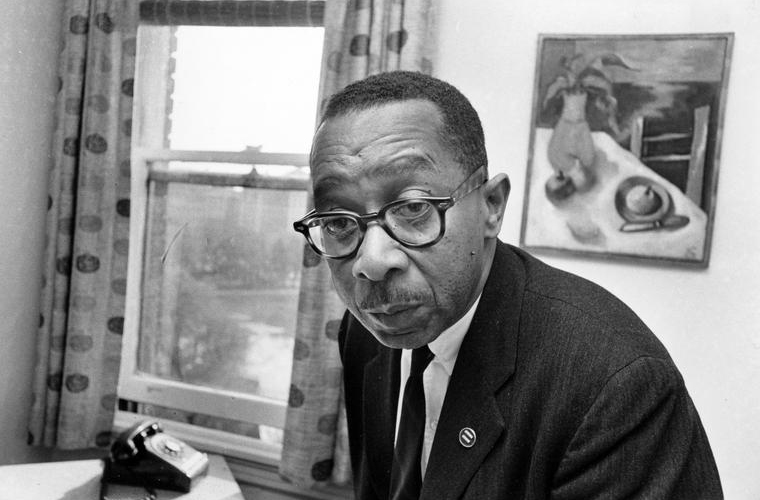Dr. Kenneth B. Clark was a prominent American social psychologist, educator, and human rights activist who made significant contributions to the field of psychology and the struggle for racial equality. He is best known for his research on the effects of racial segregation on the self-esteem and identity of Black children, which was instrumental in the landmark Supreme Court case of Brown v. Board of Education (1954) that outlawed school segregation.
Dr. Clark was born in the Panama Canal Zone on July 24, 1914, to Jamaican parents. He moved to Harlem, New York, with his mother and sister when he was five years old after his father decided to stay in Panama. He grew up in a vibrant cultural and political environment that shaped his interest in social issues and racial justice. He attended integrated public schools in Harlem, where he encountered inspiring mentors such as poet Countee Cullen and book collector Arthur Schomburg.
He pursued his higher education at Howard University in Washington, D.C., where he met his future wife and closest intellectual collaborator, Mamie Phipps Clark. They both earned their bachelor’s and master’s degrees in psychology from Howard and then became the first and second African American students to receive Ph.D.s in psychology from Columbia University in New York. They also became active members of the NAACP and participated in protests against racial discrimination.















Dr. Clark’s doctoral dissertation, titled “The Development of Consciousness of Self in Negro Pre-School Children,” was based on his wife’s master’s thesis at Howard, which initiated their groundbreaking research on how race affects children’s self-concept and self-esteem. They conducted a series of experiments using dolls of different colors to measure the preferences and attitudes of Black children toward their own racial group and others. They found that most Black children preferred white dolls over brown dolls, and attributed positive traits to white dolls and negative traits to brown dolls. They concluded that segregation and racism had a detrimental impact on the psychological development and well-being of Black children.
Their research, known as the “doll study,” was widely published in scientific journals and attracted national attention. It also caught the interest of the NAACP legal team, which used it as evidence to challenge the constitutionality of school segregation in the Brown v. Board of Education case. Dr. Clark testified as an expert witness before the Supreme Court, explaining how segregation harmed Black children’s self-image and educational opportunities. His testimony was cited by Chief Justice Earl Warren in the Court’s unanimous decision that declared “separate but equal” education inherently unequal and unconstitutional.
Dr. Clark’s research had a profound influence on the field of social psychology and the civil rights movement. He was one of the first psychologists to apply scientific methods to study social problems and to advocate for social change based on empirical evidence. He also challenged the racism and bias within the discipline of psychology, which often ignored or distorted the experiences and perspectives of people of color. He became a prominent leader and spokesperson for racial justice, education reform, community development, and human rights.
Dr. Clark joined the faculty of City College of New York in 1942, where he taught for 33 years until his retirement in 1975. He also founded several institutions and organizations to serve the needs of marginalized communities, such as the Northside Center for Child Development in Harlem (1946), which provided psychological services to low-income families; Harlem Youth Opportunities Unlimited (1962), which offered educational and vocational programs to urban youth; and Metropolitan Applied Research Center (1966), which conducted policy research on urban issues.
Dr. Clark authored or co-authored several books that addressed various aspects of racism, inequality, power, and social change, such as Prejudice and Your Child (1953), Dark Ghetto: Dilemmas of Social Power (1965), Crisis in Urban Education (1971), Pathos of Power (1974), and The Negro American (1966), which he co-edited with sociologist Talcott Parsons. He also conducted televised interviews with prominent figures such as James Baldwin, Malcolm X, and Martin Luther King Jr., which were published as The Negro Protest (1963).
Dr. Clark received numerous honors and awards for his achievements and contributions, such as the Spingarn Medal from the NAACP (1961), the Kurt Lewin Memorial Award from the Society for Psychological Study of Social Issues (1970), the Distinguished Contribution Award from the American Psychological Association (1971), and the Presidential Medal of Freedom from President Bill Clinton (1996). He also served as a member of the New York State Board of Regents (1968-1986) and as president of the American Psychological Association (1970-1971).
Dr. Clark died on May 1, 2005, at the age of 90, leaving behind a legacy of scholarship, activism, and leadership that inspired generations of psychologists, educators, and social justice advocates. He was a pioneer of social psychology and racial justice, who used his knowledge and skills to challenge oppression, empower communities, and transform society.

